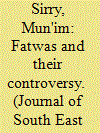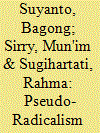| Srl | Item |
| 1 |
ID:
124274


|
|
|
|
|
| Publication |
2013.
|
| Summary/Abstract |
This article discusses a different side of two controversial fatwas - one against Muslims participating in Christmas celebrations and the other against pluralism, liberalism and secularism - issued by the Majelis Ulama Indonesia (MUI, Council of Indonesian Ulama). Most studies on MUI have emphasised the role that the Council's fatwas have played in inciting sectarian violence in Indonesia. Without denying the connections between violence and the MUI fatwas, this article argues that these controversial fatwas have also opened up room for more fruitful and constructive discussions among different religious groups in Indonesia. This article asks: What were the roots of the controversy over these intolerant fatwas? How did the state respond to them? And what does the controversy over these fatwas tell us about the nature of public debate on Islam in Indonesia? By answering these questions this article will shed light on aspects of contemporary Indonesian public debates about Islam that have been overlooked in current scholarship
|
|
|
|
|
|
|
|
|
|
|
|
|
|
|
|
| 2 |
ID:
187999


|
|
|
|
|
| Summary/Abstract |
This article discusses a recent phenomenon of radicalization among university students in Indonesia, with special attention to what may be called “pseudo-radicalists” (i.e., a group of students who have been exposed to radical ideologies); however, they are not strongly grounded in an exclusive and extreme religious viewpoint that justifies militant attitudes and violent actions. We carefully and critically examine the extent to which educated youth have been infiltrated by radical influences and how they de-radicalized themselves. Our research includes seven government tertiary institutions identified by the National Agency for Combating Terrorism or Badan Nasional Penanggulangan Terorisme as having been inflicted by radicalism, namely, Universitas Indonesia, Institut Teknologi Bandung, Institut Pertanian Bogor, Universitas Diponegoro, Institut Teknologi Sepuluh Nopember, Universitas Airlangga, and Universitas Brawijaya. By situating our case study within the existing literature on radicalization and de-radicalization, we hope that this article will enrich our perspectives and shed some light on crucial issues facing educated youth, especially within tertiary campuses.
|
|
|
|
|
|
|
|
|
|
|
|
|
|
|
|